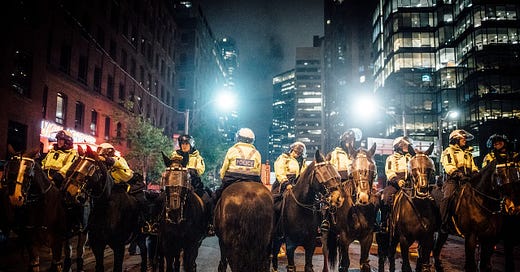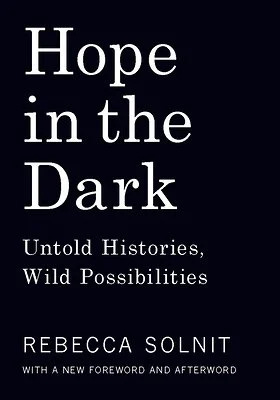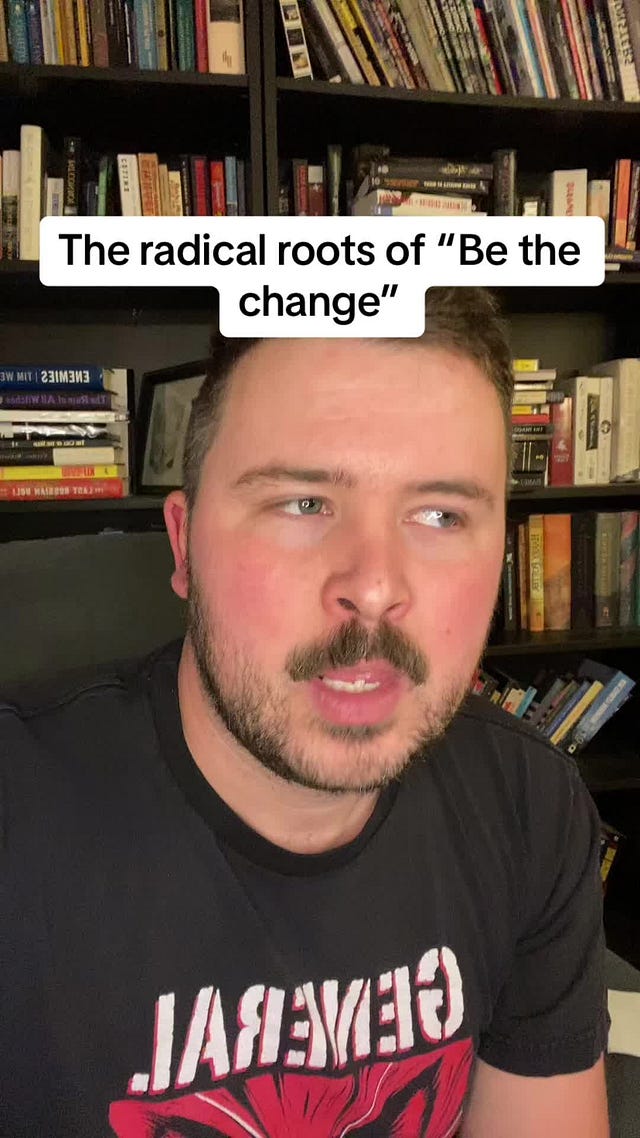I haven’t written a listicle in nearly six years, but I’ll do it for you, dear readers. I came of writing maturity in the clickbait age of the internet, so I’ve learned to loathe the medium, but this is “Revolutions” month at Better Strangers, and we do not seem to be living in particularly revolutionary times. So my “how to” article for the month would be wasted on “How to mount a revolution.”
Instead, I want to address a major problem with our current political landscape: political despair. We’re not ever going to get to a better future if people can’t imagine it, and you can’t start imagining it if you’ve resigned yourself to hopelessness. So I want to offer a list of things you can do to start deconstruct the despair mindset and start to engage politically in a meaningful way.
1. Adopt a hope mindset
Good news on this front — next month’s theme is “Hope in the Dark,” so I’ll be focusing on this topic a lot more in the coming weeks. But the first thing you need to know is that “hope” and “optimism” are not the same thing. Optimism is the belief that things will turn out well. Hope is a commitment towards making things turn out well. I talked a lot more about that distinction in the article below:
The best book on the subject is Rebecca Solnit’s Hope in the Dark, which was first published on the heels of George W. Bush’s reelection. It is republished every time the Republicans win an election cycle, but it is not just for angsty liberals — this is, at heart, a leftist book, about people fighting against extraordinary odds in truly hopeless moments in history. Buy below:
2. Study real change campaigns
Hopefully this month’s coverage of revolutions has already given you a few resources on this front, but if you feel like nothing can change, the best place to start is by looking at the way people have changed things. Last week on TikTok I discussed the radical roots of the famous Gandhi misquote, “Be the Change,” and how radical groups like the Black Panthers managed to completely change the way the American government treats childhood hunger through their local organizing efforts.
The simple truth is that change is the only constant, and when you learn to accept that, you can stop being ruled by change, and can instead learn, as Octavia Butler put it, to “shape change.”
The records for this are extensive — even in failed revolutions, lingering side effects of the attempt to make society a better placer have lived on. So instead of asking if change is possible, acknowledge that it is, and start asking how to change the world. The people who have changed the world had a tendency to leave notes. Read the notes.
3. Focus less on federal than local
My wife — who works in state government after years working at the federal level — likes to say that the federal government is like a battleship. It’s huge, and because of this, it’s hard and slow to turn around. State (and local) government, she says, is more like a speedboat. You can go fast, you can change fast, but you can also get ahead of yourself.
Part of the reason the current political landscape is so bleak is that our federal government is in absolute shambles right now. The House of Representatives is run by a wingnut, the Supreme Court seemingly walked out of a Rush Limbaugh wet dream, and the President and DNC lack the vision and the charisma to adequately fight them. So trying to change things at this level means making a commitment of years for, likely, very small incremental changes.
If that sounds exhausting to you, get off of the battleship and onto the speedboat. Even in red states there are winning causes — such as abortion rights — that you can get behind and affect real change on. Even better, these successful local and state campaigns can be upscaled into national campaigns. All change has to start at the grassroots.
4. Purge your algorithms of doom.
The primary cause of doomerism is spending too much time on the internet. This is not to say that things aren’t bad in the world, it’s just to say that internet algorithms exploit your negativity bias to exaggerate how bad they are. So if you’re feeling particularly hopeless, you might need to Get Off The Internet™.
If that’s not possible, then you can at least try to juke your algorithms a bit. Start getting your news from reliable news sites (I find that I get a good cross-section of left-leaning news by listening to NPR’s Up First, the Democracy Now! headlines, and by sporadically reading the Intercept, the Guardian and Al-Jazeera. Happy to get other recs in the comments!). Cut out commentary as much as possible, and consider that nonfiction audiobooks are a valid alternative to news podcasts (more on that in the article below).
Finally, unfollow Doomers. People who say “we’re fucked,” or “the world is doomed” or “Giant Meteor 2024” may be funny, they may even be right, but the attitude is insidious and demoralizing. Consider:
If Doomers are wrong but you believe what they’re saying, the result is you’ll give up on life, possibly missing out on doing really cool shit that you would have enjoyed. Possibly missing out on helping to save the world! Worse, what if we can fix things, but enough people bought into Doomerism that we just let the oncoming catastrophe happen?
If the Doomers are right and you reject what they’re saying and work for a better world anyway, then at the very least, when the world ends, you’ll have made life a little better for people in your corner of it.
5. Take an educational approach to posting
If you are going to stay on the internet and you are a prolific poster, consider taking an educational approach to posting. What this means is:
Cut back on hot-takes and outrage. It’s okay to feel big things about the news, but consider expressing them privately rather than publicly, as internet flamewars are an absolutely useless way to spend your time.
Focus on posting information and context. If you have an area of expertise that is relevant to the topic at hand, that’s worth sharing! Otherwise, share information from reliable sources.
The internet is a powerful educational tool when used as such. It becomes a problem when it’s built around clicks and attention-grabbing, because this is where we get stuck in echo chambers and in useless fights. Remember: It’s okay if only 3 people read your post, it might make a real difference for them1.
6. Find out what people are already doing in your area
There are already political interest groups in your area that are doing work in your community. Sometimes it takes a little bit of time to find your people, but engaging with people who are already doing the work can be an enlightening and invigorating experience. When I decided to put my activist efforts towards climate change, I found that there was work to be done on our town’s Environmental Commission (which is part of the local government) through local non-profits that were, among other things: protecting wildlife, cleaning local rivers, fighting new fossil fuel developments, addressing food insecurity, fighting environmental racism, promoting native plants, pushing storm run-off legislation, and battling eco-anxiety.
This work does not have to be limited to traditional electoral politics or traditional non-profits: you can also find local mutual aid networks through organizations like Food Not Bombs and Buy Nothing.
7. Use your local library as a mutual aid/educational resource
When I’ve discussed libraries in anarchist forums, there’s a subset of people who get extremely annoyed with me for discussing a government institution as a potential venue for mutual aid and radical education. But the fact remains: in many communities, the library is the only remaining public space that is literally open to everyone.
Libraries are also radically egalitarian in a sense that few other existing institutions are. Want to start a book club, a lecture series, a community organization? There’s a good chance the library will host you for free. Want to create a space where people can share not only books, but seeds, tools, and cooking instruments like cake pans? Go to the library.
Obviously, some libraries are more conservative than others, but if you have at least a fairly progressive library, there’s already an insane amount of work you can get done through the institution. And if your library is conservative — well, see if you can get on its board or its foundation. And start radicalizing it.
How do you battle despair and political disempowerment? Tell us in the comments below!
Take it from me! I have tons of experience putting a lot of work into stuff that only gets read by two people. Those two people are usually pretty appreciative when you talk to them, though.









A good way I've found to accomplish #4 -- Purge your algorithms of doom -- is to use a non-algorithmic, non-flashy, non-ad saturated newsreader.
Personally, I like Inoreader, which allows up to 150 RSS (and other types of) feeds in its free version, is both app- and web-based. No, I'm not affiliated with Inoreader -- I just like what they're doing.
Also, for #5 -- Take an educational approach to posting -- in addition to "focus[ing] on posting information and context," I would add a focus on posting SOLUTIONS. Two examples of this would be: posting links to organizations that are helping the less-fortunate, and boosting (sharing, re-tweeting, etc.) posts by those organizations.
Great article. Thanks for the read.